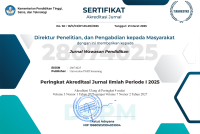HOUSE WARAC (HOUSEHOLD WASTE OIL FOR RELAXING AROMATHERAPY CANDLE)
Abstract
Keywords
Full Text:
PDFReferences
Aini, D. N., Arisanti, D. W., Fitri, H. M., & Safitri, L. R. (2020). Pemanfaatan Minyak Jelantah Untuk Bahan Baku Produk Lilin Ramah Lingkungan Dan Menambah Penghasilan Rumah Tangga Di Kota Batu. Warta Pengabdian, 14(4), 253–262.
Astuti, A., Linarti, U., & Yulistiyanto, M. (2019). Identifying Waste Cooking Oil Chains to Become an Energy Resource: Study Case in Yogyakarta. Advances in Intelligent Systems Research, 171, 228–236.
Astuti, A., Linarti, U., & Yulistiyanto, M. (2021). Pengolahan Limbah Minyak Jelantah Menjadi Lilin Aromaterapi Di Bank Sampah Lintas Winongo, Kelurahan Bumijo, Kecamatan Jetis, Kota Yogyakarta. SPEKTA Jurnal Pengabdian Kepada Masyarakat : Teknologi dan Aplikasi. 2(1). 73-82
Delta. (2021). Pemanfaatan Minyak Jelantah (Waste Cooking Oil) Dalam Pembuatan Lilin Aroma Terapi. Jurnal Kesehatan Luwu Raya, 7(2), 127– 132.
Hambali, E. (2007), Teknologi Bioenergi, Agromedia Pustaka, Jakarta.
Kuo, C. Y., & Ann, D. K. (2018). When fats commit crimes: Fatty acid metabolism, cancer stemness and therapeutic resistance. Cancer Communications, 38(1), 1–12.
M. Manurung, N. M. Suaniti, dan K. G. Dharma Putra. (2018). Perubahan Kualitas Minyak Goreng Akibat Lamanya Pemanasan. Jurnal Kimia,
Melia Megawati, Muhartono. (2019). Konsumsi Minyak Jelantah dan Pengaruhnya terhadap Kesehatan. Medical Journal of Lampung University.
Omojola Awogbemi, Daramy Vandi Von Kallon, Victor Sunday Aigbodion, Sandeep Panda. (2021). Advances in biotechnological applications of waste cooking oil, Case Studies in Chemical and Environmental Engineering, Volume 4.
Putra, Terry I., Setyowati, Nanik, Apriyanto, Enggar. (2019). Identifikasi Jenis Dan Pengelolaan Limbah Bahan Berbahaya Dan Beracun Rumah Tangga: Studi Kasus Kelurahan Pasar Tais Kecamatan Seluma Kabupaten Seluma. NATURALIS – Jurnal Penelitian Pengelolaan Sumberdaya Alam dan Lingkungan, 8 (2), 49-61.
Vanessa, M. C., & Bouta, J. M. F. (2017). Analisis Jumlah Minyak Jelantah yang dihasilkan Masyarakat di Wilayah JABODETABEK. Politeknik Manufaktur Negeri Bangka Belitung, (January), 1–21.
Varah, Maulidah Azmi. (2020). Analisa Kadar Bilangan Peroksida Pada Berbagai Macam Minyak Jelantah Penjual Gorengan. Diploma thesis, Universitas Muhammadiyah Surabaya.
Wardani, D. T. K., Saptutyningsih, E., & Fitri, S. A. (2021). Ekonomi Kreatif: Pemanfaatan Limbah Jelantah Untuk Pembuatan Lilin Aromaterapi. Prosiding Seminar Nasional Program Pengabdian Masyarakat, 402–417.
DOI: https://doi.org/10.26877/wp.v3i2.16347
Refbacks
- There are currently no refbacks.
Copyright (c) 2023 Nur Ulfah Maulida, Umniyyatul Makmuroh

This work is licensed under a Creative Commons Attribution-NonCommercial-NoDerivatives 4.0 International License.
Jurnal Wawasan Pendidikan
ISSN 2807-5714 (Print), ISSN 2807-4025 (Online)
Universitas Persatuan Guru Republik Indonesia Semarang
Jl. Sidodadi Timur No. 24 -Dr. Cipto, Semarang
Prasena Arisyanto, S.Pd., M.Pd
Email: prasenaarisyanto@upgris.ac.id

This work is licensed under a Creative Commons Attribution-NonCommercial-NoDerivatives 4.0 International License










